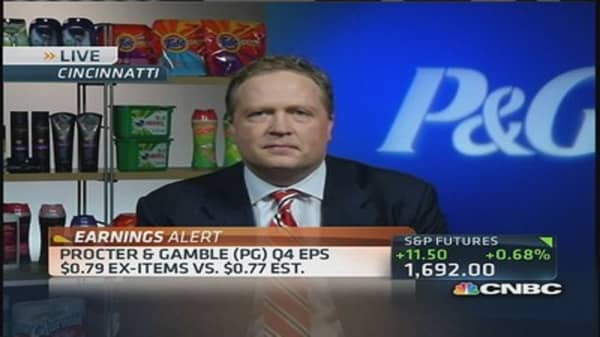Procter & Gamble reported earnings and revenue that beat analysts' expectations on Thursday, its first results since bringing veteran Chief Executive Officer A.G. Lafley back in May to run the company.
After the earnings announcement, the company's shares moved higher. (Click here to get the latest quote.)
"It feels good" to have Lafley back, CFO Jon Moeller said on CNBC's "Squawk Box" on Thursday shortly after the earnings result. "I'm very optimistic about the future as we look forward."
(Read more: Track quarterly profit and loss reports in CNBC's Earnings Central)
The company posted fiscal fourth-quarter earnings excluding items of 79 cents per share, down from 82 cents a share in the year-earlier period. Revenue increased to $20.7 billion from $20.21 billion a year ago.
Analysts had expected earnings excluding items of 77 cents a share on $20.55 billion in revenue, according to a consensus estimate from Thomson Reuters.
For the year, net income after paying preferred dividends rose 5 percent to $11.31 billion, or $3.86 per share. That compares with net income of $10.76 billion, or $3.66 per share in the previous year. Revenue rose 1 percent to $84.17 billion from $83.68 billion a year ago.
"This is the first time we've provided an organic sales outlook for the next fiscal year," Moeller said. "We're expecting 3-4 percent" growth.
The world's largest consumer product company has been working on a turnaround aimed at focusing on its top 40 top businesses, 20 biggest new products and 10 most-profitable emerging markets as it undergoes a cost cutting plan aimed at saving $10 billion by fiscal 2016.
In the summer of 2012, activist investor William Ackman bought a big stake P&G and then pushed for management changes. Lafley, who ran the company from 2000 to 2009, came back out of retirement on May 23 to accelerate turnaround efforts and to replace CEO Bob McDonald, whom Ackman publicly criticized.
(Flashback: P&G CEO McDonald Retiring Due to 'Distraction' of Critics' Attention)
"The biggest complaint across the shareholder base or the biggest opportunity they saw was for us to reduce costs even further," Moeller said. "We've made good progress along that line. We're on track or ahead of most of our productivity goals."
Moeller added that activist investors in general can be very constructive. "They can increase the efficiency of markets. They can potentially unlock value. But on the other hand, they can be destructive if their timelines aren't aligned with the rest of the shareholder group or the natural cycle of the business." He also said that all "shareholders are very important."
In the face of China's slowing economic growth, Moeller acknowledged a shift in several of the developing markets. "But still growth rates are very attractive: High single-digits to 10 percent in China."
As for Europe, he said, "[it's] essentially the same in terms of demand for products in our product categories. It's somewhere between minus 1 [and] plus 1 percent depending on the quarter."




